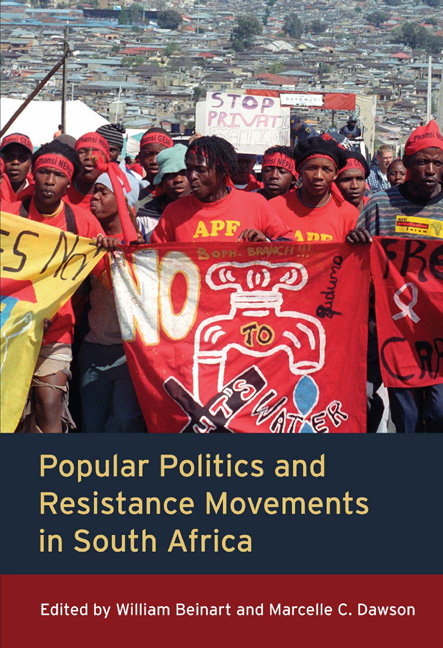Book contents
- Frontmatter
- Contents
- Contributors
- List of Abbreviations and Acronyms
- 1 Popular politics and resistance movements in South Africa, 1970–2008
- 2 The Durban strikes of 1973: Political identities and the management of protest
- 3 ‘There's more to it than slurp and burp’: The Fatti's & Moni's strike and the use of boycotts in mass resistance in Cape Town
- 4 The role of the African National Congress in popular protest during the township uprisings, 1984–1989
- 5 Strategies of struggle: The Nelson Mandela campaign
- 6 From removals to reform: Land struggles in Weenen in KwaZulu-Natal, South Africa
- 7 From popular resistance to populist politics in the Transkei
- 8 ‘It's a beautiful struggle’: Siyayinqoba/Beat it! and the HIV/AIDS treatment struggle on South African television
- 9 The Nelson Mandela Museum and the tyranny of political symbols
- 10 Black nurses’ strikes at Baragwanath Hospital, Soweto, 1948–2007
- 11 The ‘New Struggle’: Resources, networks and the formation of the Treatment Action Campaign (TAC) 1994–1998
- 12 New social movements as civil society: The case of past and present Soweto
- 13 ‘Phansi Privatisation! Phansi!’: The Anti-Privatisation Forum and ideology in social movements
- Endnotes
- Bibliography
- Index
6 - From removals to reform: Land struggles in Weenen in KwaZulu-Natal, South Africa
Published online by Cambridge University Press: 21 April 2018
- Frontmatter
- Contents
- Contributors
- List of Abbreviations and Acronyms
- 1 Popular politics and resistance movements in South Africa, 1970–2008
- 2 The Durban strikes of 1973: Political identities and the management of protest
- 3 ‘There's more to it than slurp and burp’: The Fatti's & Moni's strike and the use of boycotts in mass resistance in Cape Town
- 4 The role of the African National Congress in popular protest during the township uprisings, 1984–1989
- 5 Strategies of struggle: The Nelson Mandela campaign
- 6 From removals to reform: Land struggles in Weenen in KwaZulu-Natal, South Africa
- 7 From popular resistance to populist politics in the Transkei
- 8 ‘It's a beautiful struggle’: Siyayinqoba/Beat it! and the HIV/AIDS treatment struggle on South African television
- 9 The Nelson Mandela Museum and the tyranny of political symbols
- 10 Black nurses’ strikes at Baragwanath Hospital, Soweto, 1948–2007
- 11 The ‘New Struggle’: Resources, networks and the formation of the Treatment Action Campaign (TAC) 1994–1998
- 12 New social movements as civil society: The case of past and present Soweto
- 13 ‘Phansi Privatisation! Phansi!’: The Anti-Privatisation Forum and ideology in social movements
- Endnotes
- Bibliography
- Index
Summary
Introduction
Land activism and land reform were key sites of struggle during the years of transition in South Africa. Segregation and apartheid had barred land ownership by black people in many parts of the country and had gradually eroded their access to rural resources. While South Africa's liberation movements were not primarily rooted in the rural areas, many activists came from this background and rural politics and non-governmental organisations (NGOs) produced important popular leaders. New local struggles gave voice to communities that had been politically marginalised. But land struggles sometimes proved to be divisive, reinforcing old conflicts as much as creating new movements. Sustained regional organisation on the land was often more difficult than in the townships.
This chapter discusses the quest for land reform by African farm tenants and labourers in the district of Weenen in mid-western KwaZulu-Natal (KZN). Weenen is a small district of 628 square kilometres and had a total population of 14,000 in 1980. Unfavourable agricultural conditions in the area, together with its location off major highways, limited the development of modern commercial farming and irrigation. Most farms in Weenen were white owned, but many historically accommodated a large number of African tenant families. Under the labour tenancy system, African tenants worked for farmers for six months of the year in exchange for their right to reside, cultivate certain plots and graze their livestock on the farms of their employers. This system, originating in the nineteenth-century colonial period, was associated with less-intensive agricultural practices and ran counter to the ideology and policy of apartheid. It was finally outlawed in the district in 1969 and an estimated 10,000 people were evicted from farms in the next few years. The majority of them were relocated to closer settlement villages at Tugela Estates on land administered by the South African Development Trust, adjoining the KwaZulu district of Msinga. The abolition of labour tenancy, however, did not completely eradicate African farm tenancy, nor did it stop farm evictions. Sporadic evictions continued and racial tension over land increased in many parts of this district after 1969.
- Type
- Chapter
- Information
- Popular Politics and Resistance Movements in South Africa , pp. 117 - 140Publisher: Wits University PressPrint publication year: 2010



